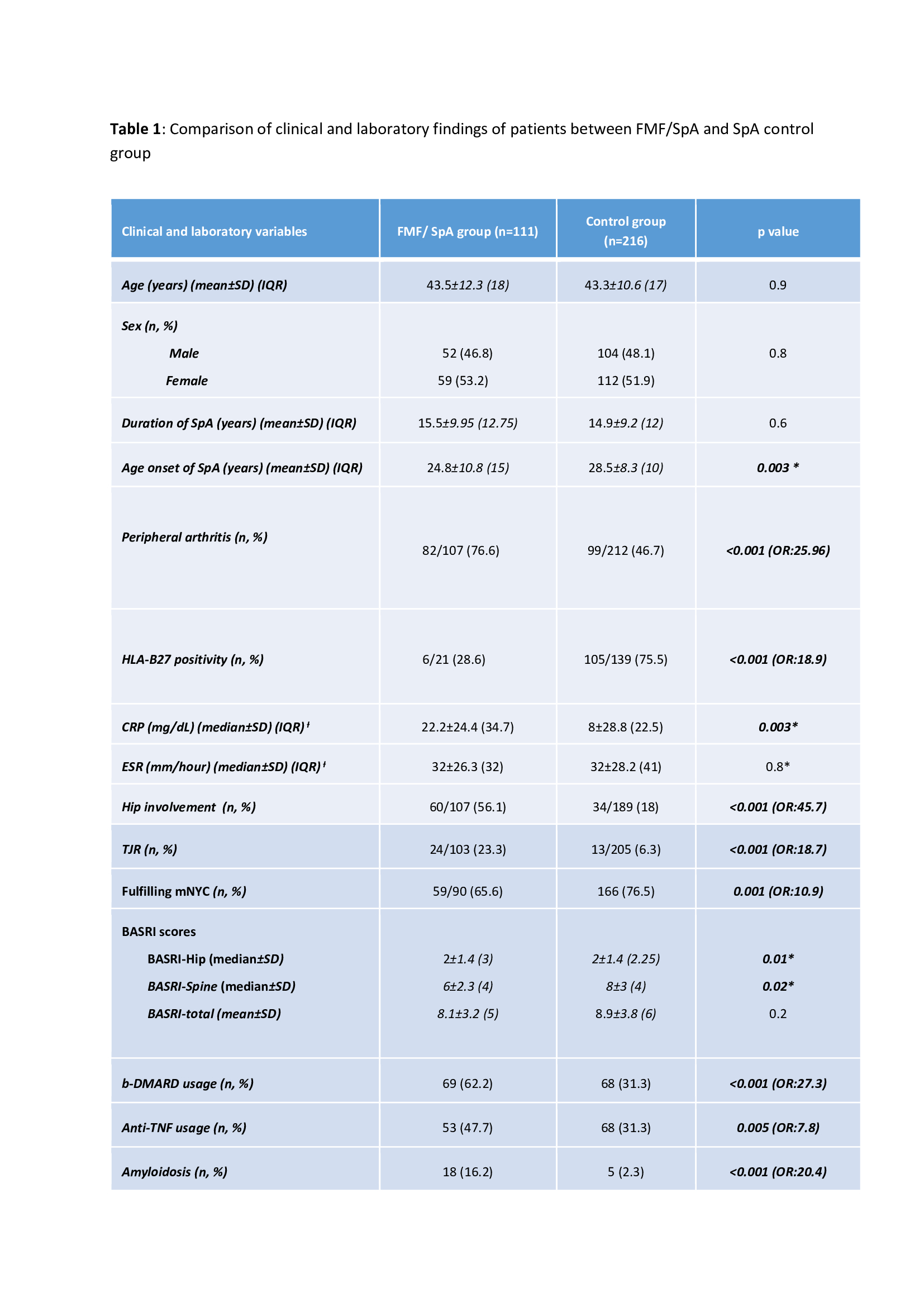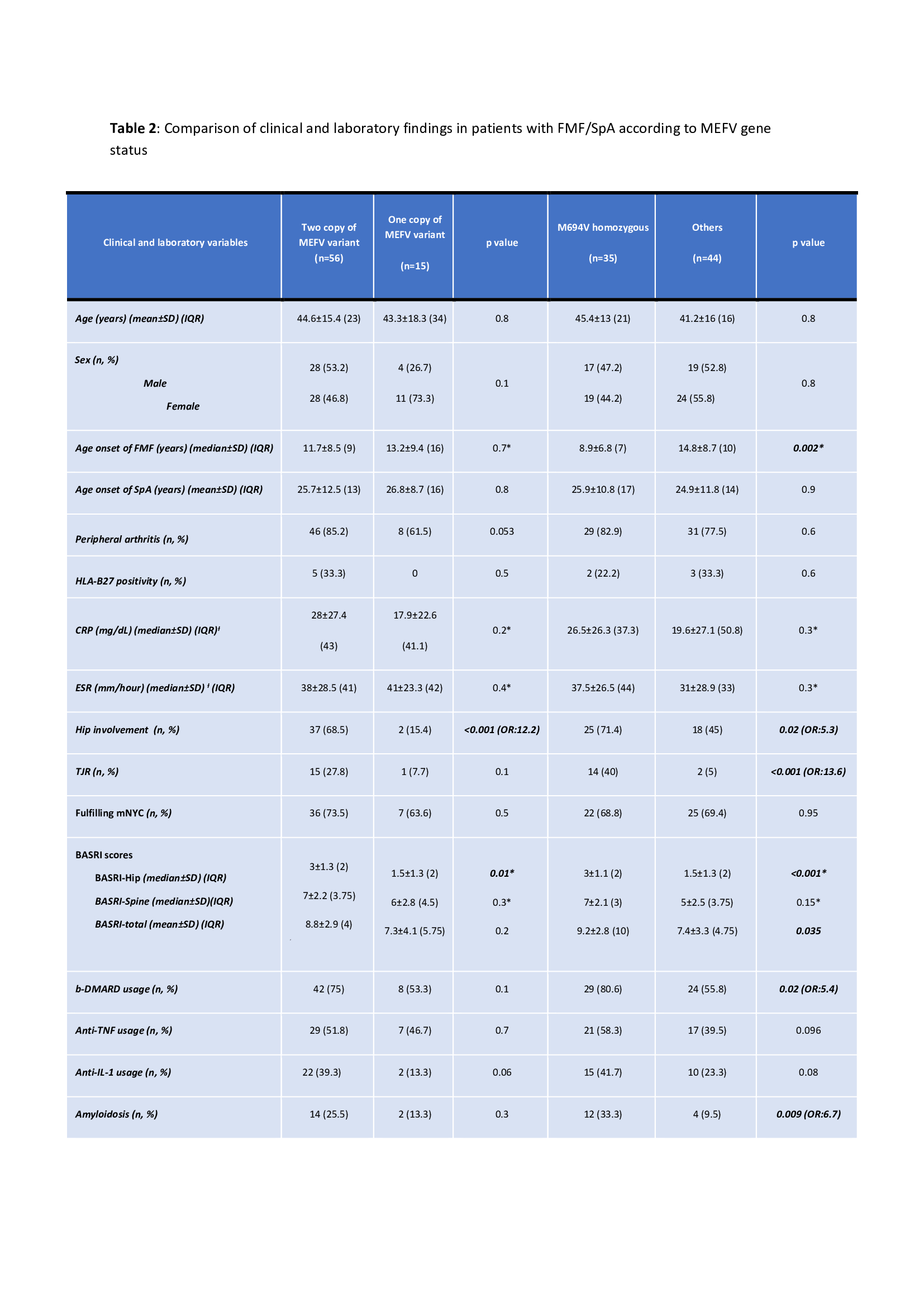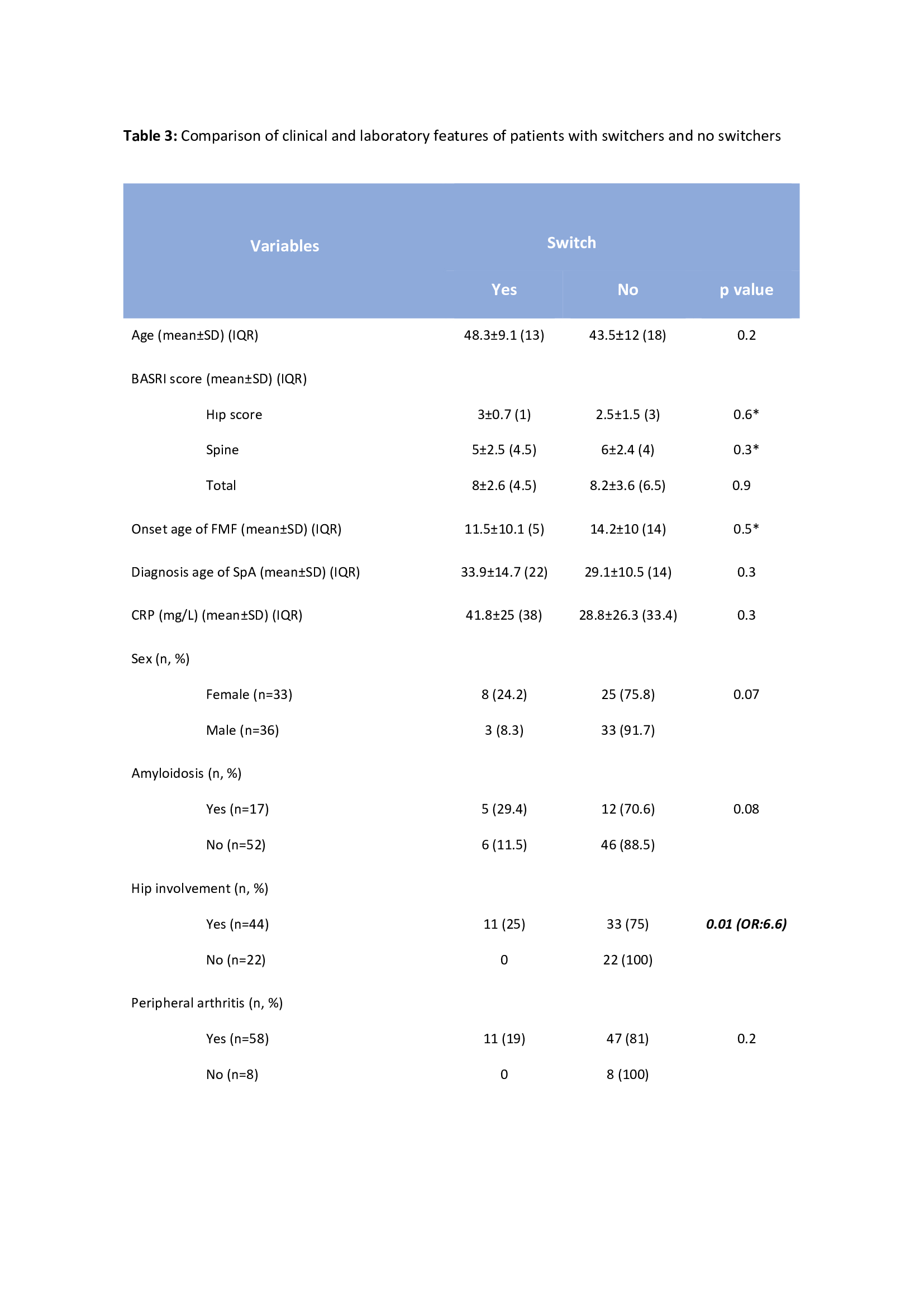Session Information
Date: Monday, November 8, 2021
Session Type: Poster Session C
Session Time: 8:30AM-10:30AM
Background/Purpose: Familial Mediterranean Fever (FMF), an autoinflammatory disease, is characterized by self-limited inflammatory attacks. A significant proportion of patients with FMF experience episodes of acute monoarthritis, however 5 % of patients have chronic arthritis, usually of hips or knees. In this study we aimed to evaluate clinical and laboratory characteristics, genotype/phenotype correlation, outcome and biological DMARD responses in patients with FMF-associated SpA (FMF/SpA) who followed up in our tertiary referral clinic.
Methods: One hundred and twenty-four patients with FMF who fulfilled Tel Hashomer criteria and coexisting SpA were evaluated. After exclusion of 13 patients with missing data, 111 patients included into the analysis. Diagnosis of SpA was made by ASAS and/or modified New York criteria (mNYC). Axial radiographic changes were evaluated and scored according to Bath Ankylosing Spondylitis Radiology Index (BASRI) in plain radiography.
Results: One hundred and eleven patients whom 53.2% were female included into the analysis. Mean follow-up time and patient age were 93.6±76.9 (3-324) months, 43.5±12.3 (20-87) years, respectively. Clinical and laboratory characteristics of study participants were summarized in table 1. SpA subtypes were; axial in 23.4%, axial and peripheral in 62.6% and only peripheral in 14% in FMF/SpA group. 56.1% (80.7% bilaterally) of patients had hip involvement, 34.7% knee and 27.7% ankle arthritis. Overall, 23.3% underwent total joint replacement (TJR) in patients with FMF/SpA. Hip involvement and need for TJR were higher in FMF/SpA group compared to control group (table 1).
While 79 results were available, most frequent MEFV variant was M694V homozygote (44.3%). Hip involvement was higher in patients who had two MEFV variants compared to one copy and M694V homozygous compared to others. Need for TJR was higher in M694V homozygous compared to other MEFV variants. Radiographic sacroiliitis was lower in patients with FMF/SpA compared to control group but similar both in patients who had two MEFV variants compared to one copy and M694V homozygous compared to other MEFV variants. HLA-B27 positivity was lower in patients with FMF/SpA compared to control group (table 2)
Average BASRI hip scores were higher in patients with FMF/SpA compared to SpA only (p=0.01) and also higher both had two MEFV variants compared to one copy (p=0.01) and M694V homozygous compared to other MEFV variants (p< 0.001). Average BASRI-spine scores were higher in patients with SpA compared to FMF/SpA group (p=0.02); but did not differ among various MEFV variants. Average BASRI-total scores did not differ in patients with FMF/SpA and control group and only higher in patients had M694V homozygous compared to other MEFV variants (p=0.035) (table 2).
Conclusion: In our study, hip involvement and need for TJR were associated with MEFV carriage rather than HLA-B27 positivity and higher in patients with FMF/SpA compared to the patients with SpA alone. Our study indicates that the patients with FMF/SpA had more severe disease course including worse outcome and destructive hip involvement than those with SpA alone, especially in patients carrying two copy MEFV variants and M694V homozygous.
 SD: standard deviation, CRP: C reactive protein, ESR: Erythrocyte sedimentation rate, OR: Odds ratio, TJR: Total joint replacement, mNYC: modifyed New York criteria, b-DMARD: Biological disease modifying antirheumatic drugs Ɨ during the attack free period *Mann Whitney U test
SD: standard deviation, CRP: C reactive protein, ESR: Erythrocyte sedimentation rate, OR: Odds ratio, TJR: Total joint replacement, mNYC: modifyed New York criteria, b-DMARD: Biological disease modifying antirheumatic drugs Ɨ during the attack free period *Mann Whitney U test
 SD: standard deviation, IQR: Interquartile range, CRP: C reactive protein, ESR: Erythrocyte sedimentation rate, OR: Odds ratio, TJR: Total joint replacement, mNYC: modifyed New York criteria, b-DMARD: Biological disease modifying antirheumatic drugs Ɨ during the attack free period *Mann Whitney U test
SD: standard deviation, IQR: Interquartile range, CRP: C reactive protein, ESR: Erythrocyte sedimentation rate, OR: Odds ratio, TJR: Total joint replacement, mNYC: modifyed New York criteria, b-DMARD: Biological disease modifying antirheumatic drugs Ɨ during the attack free period *Mann Whitney U test
 *Mann Whitney U test Ɨ According to modified New York Criteria SD: standard deviation, FMF: Familial Mediterranean Fever, SpA: Spondyloarthritis, IQR: Interquartile range, CRP: C reactive protein, OR: Odds ratio, TJR: Total joint replacement, ESRD: End stage renal disease
*Mann Whitney U test Ɨ According to modified New York Criteria SD: standard deviation, FMF: Familial Mediterranean Fever, SpA: Spondyloarthritis, IQR: Interquartile range, CRP: C reactive protein, OR: Odds ratio, TJR: Total joint replacement, ESRD: End stage renal disease
To cite this abstract in AMA style:
Bektaş M, Sari S, Cetin C, Dulundu B, Koca N, Ince B, Yalcinkaya Y, Esen B, İnanç M, Öcal L, Gül A. More Frequent, Earlier Hip Involvement and Poor Outcome in Spondyloarthritis Associated with Familial Mediterranean Fever [abstract]. Arthritis Rheumatol. 2021; 73 (suppl 9). https://acrabstracts.org/abstract/more-frequent-earlier-hip-involvement-and-poor-outcome-in-spondyloarthritis-associated-with-familial-mediterranean-fever/. Accessed .« Back to ACR Convergence 2021
ACR Meeting Abstracts - https://acrabstracts.org/abstract/more-frequent-earlier-hip-involvement-and-poor-outcome-in-spondyloarthritis-associated-with-familial-mediterranean-fever/
